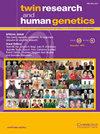遗传和环境对韩国双胞胎感知压力的影响
IF 1.2
4区 医学
Q4 GENETICS & HEREDITY
引用次数: 0
摘要
研究人员提出,文化对感知压力(PS)有重大影响。然而,迄今为止,有关 "感知压力 "的双生子研究大多是在西方个人主义文化中进行的,这些研究表明,可控(个人)生活事件导致的 "感知压力 "比不可控(网络)生活事件导致的 "感知压力 "更容易遗传。本研究旨在调查遗传和环境对韩国双胞胎 PS 的影响。韩国奉行占主导地位的集体主义文化。共有 1372 名双胞胎(平均年龄 = 22.4 ± 2.5 岁)完成了关于 PS 的在线调查,其中包括友谊、学业压力、未来职业、家庭冲突和家庭经济困难(FFD)等量表。友谊、学业压力和未来职业生涯可视为个人生活事件引起的 PS,而家庭冲突和家庭经济困难则是网络生活事件引起的 PS。一般的性别限制模型拟合分析表明,遗传和环境影响因素不存在定性或定量的性别差异。具体来说,男女两性在友谊(63%)、学业压力(67%)和未来职业(57%)方面都主要受到遗传的叠加影响,其余的变异归因于非共享环境影响。相比之下,共同环境对家庭冲突(男女均为 47%)和 FFD(男性为 64%,女性为 63%)的影响最大,而遗传效应并不显著。尽管PS的均值和方差存在已知的文化差异,但韩国双胞胎在个人生活事件导致的PS中表现出显著的遗传效应,而在网络生活事件导致的PS中表现出巨大的共享环境效应,这与西方样本相似。本文章由计算机程序翻译,如有差异,请以英文原文为准。
Genetic and Environmental Influences on Perceived Stress in South Korean Twins
Researchers have proposed that culture significantly influences perceived stress (PS). To date, however, twin studies on PS have been conducted mostly in western, individualistic cultures, which demonstrate that PS due to controllable (personal) life events is more heritable than PS due to uncontrollable (network) life events. This study aimed to investigate genetic and environmental influences on PS in South Korean twins. South Korea practices a dominant collectivist culture. In total, 1372 twin individuals (mean age = 22.4 ± 2.5 years) completed an online survey on PS, which consisted of the scales, Friendship, Academic Stress, Future Career, Family Conflicts, and Family Financial Difficulties (FFD). Friendship, Academic Stress, and Future Career can be considered PS due to personal life events, and Family Conflict and FFD, PS due to network life events. The general sex-limitation model-fitting analysis revealed the absence of qualitative or quantitative sex differences in genetic and environmental influences. Specifically, additive genetic influences were predominant for Friendship (63%), Academic Stress (67%), and Future Career (57%) for both sexes, with the remaining variance attributable to nonshared environmental influences. In contrast, shared environmental influences were largest for Family Conflict (47% for both genders) and FFD (64% for males, 63% for females) with no significant genetic effects. Despite known cultural differences in the means and variances of PS, South Korean twins exhibited significant genetic effects in PS due to personal life events and large shared environmental effects in PS due to network life events, which is similar to western samples.
求助全文
通过发布文献求助,成功后即可免费获取论文全文。
去求助
来源期刊

Twin Research and Human Genetics
医学-妇产科学
CiteScore
1.50
自引率
11.10%
发文量
37
审稿时长
6-12 weeks
期刊介绍:
Twin Research and Human Genetics is the official journal of the International Society for Twin Studies. Twin Research and Human Genetics covers all areas of human genetics with an emphasis on twin studies, genetic epidemiology, psychiatric and behavioral genetics, and research on multiple births in the fields of epidemiology, genetics, endocrinology, fetal pathology, obstetrics and pediatrics.
Through Twin Research and Human Genetics the society aims to publish the latest research developments in twin studies throughout the world.
 求助内容:
求助内容: 应助结果提醒方式:
应助结果提醒方式:


